Yes, it can be harmful for babies to watch television. Excessive screen time, especially before age two, disrupts brain development and leads to significant language delays. Babies miss out on critical human interactions that foster learning and communication skills. Background TV decreases engaging playtime and social interaction, which are essential for growth. Additionally, screens can interfere with their sleep patterns. Discover more about how screen exposure impacts your child's development and ways to manage it effectively.
Key Takeaways
- Infants under 18 months should avoid screen time, as it disrupts language growth and cognitive development.
- Excessive screen exposure correlates with significant language delays, with only 2% effectiveness in language development for children under 2.
- Background television diminishes interactive learning opportunities, hindering essential conversations necessary for language acquisition.
- Increased screen time disrupts sleep patterns in infants, affecting melatonin production and leading to developmental issues.
- Prioritizing human interaction over screens fosters better language skills and cognitive growth in young children.
Understanding Screen Time Recommendations for Infants
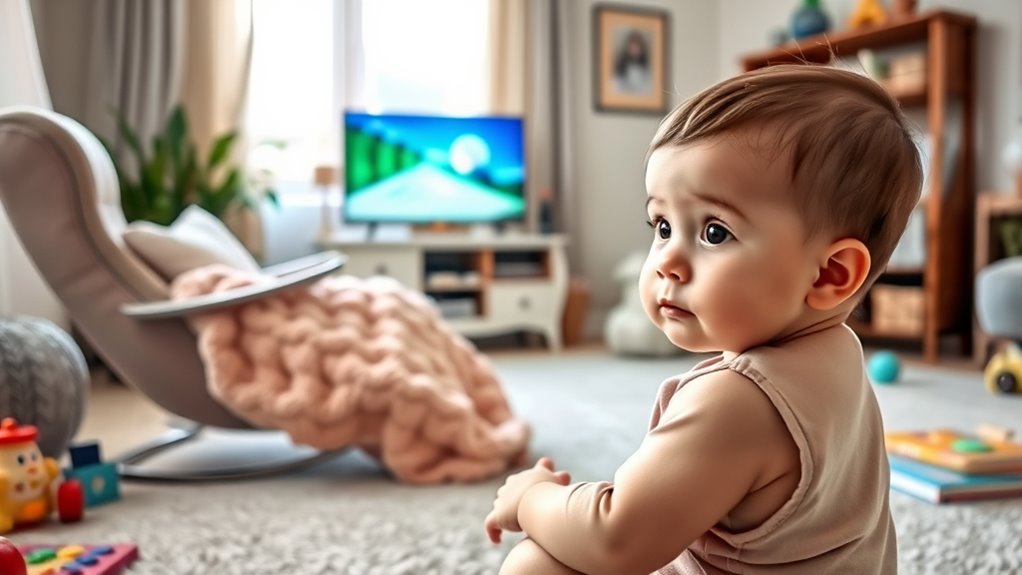
When it comes to screen time for infants, understanding the guidelines is vital for promoting healthy development. The American Academy of Pediatrics recommends that children under 18 months avoid screen time entirely, except for video chatting.
Despite this, research shows that 92% of one-year-olds have engaged with mobile devices. Excessive screen time can negatively impact language development and cognitive processing, as infants often struggle to grasp screen images. Additionally, heavy TV viewing correlates with a higher likelihood of language delays, as routine health checks can help identify concerns early. It's important to recognize that emotional dysregulation can also affect a child's ability to focus and engage with their environment. Furthermore, critical periods for skill acquisition highlight the necessity of interactive play during infancy to foster essential developmental milestones. Engaging in educational play with toys can significantly enhance a child's cognitive and emotional growth. To support your child's growth, prioritize interactive engagement with caregivers over passive screen time. Early detection of developmental delays is crucial, so during well-child visits, discuss your infant's screen time with your pediatrician to guarantee healthier developmental outcomes.
The Impact of Screen Time on Brain Development
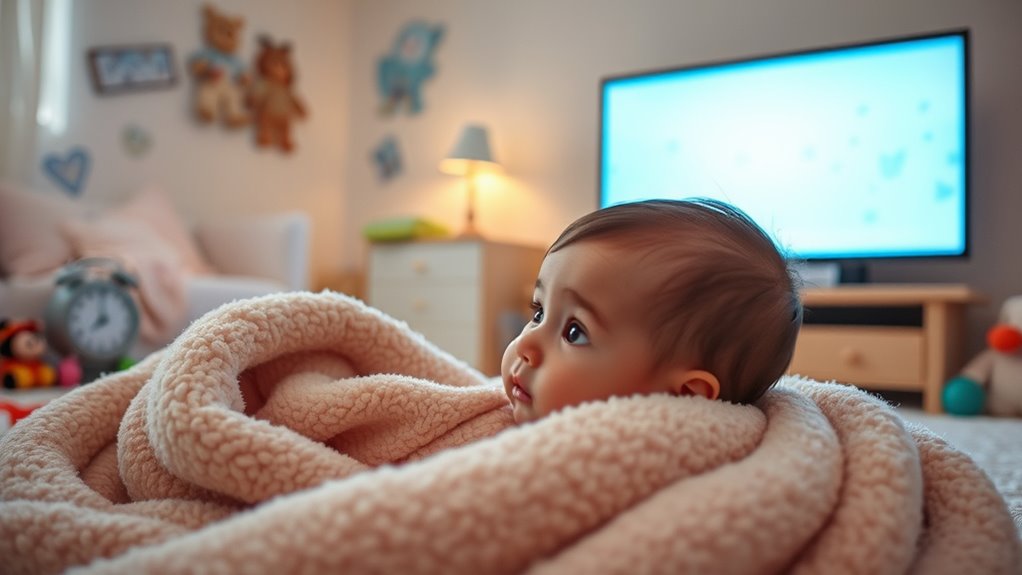
As you consider how screen time affects your baby's brain development, it's important to recognize the critical role of human interaction. Excessive exposure to screens can disrupt language growth and hinder overall cognitive skills. Additionally, proper nutrition is essential for brain development and can help mitigate some negative effects of screen time on cognitive growth. Regular puppy socialization can also promote healthy development in children by fostering their ability to interact with others effectively. Moreover, understanding the emotional volatility associated with certain developmental challenges can further support a child's healthy growth. Engaging in digital literacy programs can help parents and caregivers better navigate the impact of technology on their child's development. Furthermore, incorporating mindfulness practices into daily routines can enhance self-awareness and support emotional regulation in young children.
Screen Time and Brain Growth
While many parents may think that a little screen time is harmless, research shows that excessive exposure during the critical early years can considerably affect brain development. Infants are particularly vulnerable, as their brains develop rapidly, and too much screen time can lead to negative effects on cognitive development and memory.
| Screen Time Impact | Consequences |
|---|---|
| High Screen Time | Language delays |
| Background TV | Reduced parental interaction |
| Low Brain Integrity | Impaired literacy development |
As infants absorb stimuli from screens, they struggle to make connections between symbols and real-world equivalents. Limiting screen time can foster better cognitive growth, allowing for healthier language development and stronger brain connections.
Language Development Impact
Although many parents may believe that a little screen time won't hurt, it can greatly hinder language development in infants. Research shows that excessive screen time, especially before 18 months, can lead to significant language delays.
When children become passive viewers, they miss out on vital interactive learning opportunities with caregivers. The American Academy of Pediatrics recommends avoiding screen time for kids under 18 months to foster ideal language skills.
Studies indicate that children under 2 exposed to heavy TV viewing display only 2% effectiveness in language development compared to engaging interactions. Infants with significant screen exposure are at a higher risk of language delays, emphasizing the need for active parental engagement during their formative years.
Importance of Human Interaction
Human interaction plays a pivotal role in a child's development, markedly influencing their brain growth and learning capacities. Engaging with caregivers through conversation and play fosters important language development, unlike passive viewing of screens.
When children are exposed to excessive screen time, especially before 18 months, they risk language delays and cognitive impairments due to a lack of active learning opportunities. Background television can further diminish the quality and quantity of interactions that are essential for nurturing these skills.
Prioritizing real-life interactions over passive screen time is imperative; it allows your child to grasp social cues and language tones effectively. Remember, the more you engage with your little one, the better their cognitive and language skills will flourish.
How Television Affects Language Skills in Babies
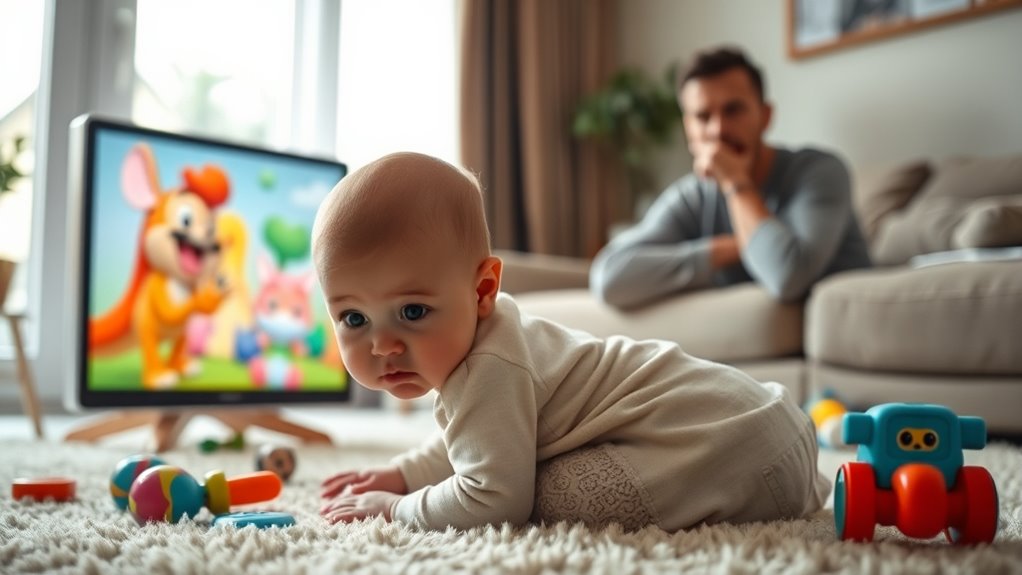
When it comes to your baby's language skills, too much television can actually delay their development.
Passive viewing cuts down on the important interactions they need with you, which are essential for learning to speak.
Language Delays From Viewing
As babies grow and develop, the way they learn language is essential for their overall communication skills, and excessive television viewing can greatly hinder this process.
Research shows that infants who spend too much time in front of screens face significant language delays. The American Academy of Pediatrics warns against screen time for children under 18 months, highlighting that passive viewing limits language interaction with parents, which is vital for development.
A study found that children with high screen exposure had fewer conversations, leading to expressive language delays. In fact, real-life interactions are far more effective for language learning, with TV's impact being only about 2%.
Prioritizing engagement over screens can help your baby thrive linguistically.
Importance of Interaction
While it might seem entertaining for babies to watch television, the reality is that meaningful interaction plays an essential role in their language development.
Excessive passive screen time can lead to expressive language delays because it reduces the significant interactions they need with you. Infants who spend too much time in front of the TV miss out on important language interactions that help develop their communication skills.
Research shows that active parental involvement, like vocal play and conversation, is far more effective than background TV. Engaging with your baby through real-life activities fosters focused attention and cognitive processing, laying a strong foundation for language acquisition.
Prioritizing interaction over screen time is key to nurturing your child's expressive language skills.
Passive Learning Challenges
Though many parents may believe that television can be an educational tool for their babies, it often creates passive learning challenges that hinder language development. Research shows that excessive screen time around 18 months can delay language skills, as infants become passive viewers rather than active participants.
Children under 2 learn language much better through real interactions; TV is only 2% as effective compared to face-to-face communication. Background television can also cut down on verbal interaction between you and your infant, leading to poorer language outcomes.
While active parental engagement during screen time can help, it's essential to prioritize interactive play and conversation over passive viewing to foster your baby's language development effectively.
The Importance of Human Interaction Over Screen Time
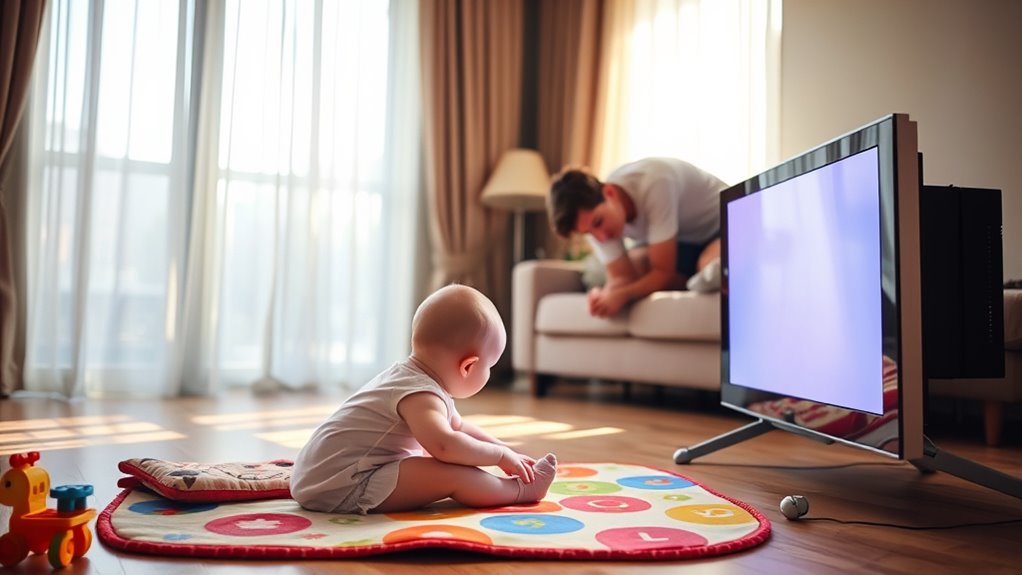
Human interaction plays a significant role in your baby's development, providing them with essential language skills and social cues that screens simply can't offer. Engaging with your child fosters cognitive development and strengthens their language acquisition. Here's a quick comparison of human interaction versus screen time:
| Human Interaction | Screen Time |
|---|---|
| Enhances language development | Limits communication |
| Encourages parental engagement | Passive learning |
| Builds social skills | Reduces emotional connection |
Children under 18 months can't comprehend screen content effectively, making your direct involvement essential. Research shows that those who engage in meaningful conversations have improved communication abilities. Prioritize human interaction to support your baby's growth and learning.
The Role of Background Television in Child Development

Screen time, particularly in the form of background television, can greatly impact your baby's development.
Studies show that background television reduces playtime and focused attention in young children, leading to less interactive engagement with you. When your child is exposed to background TV, they spend markedly less time interacting with you, which can hinder their language development and social skills.
Additionally, the distractions from background television disrupt cognitive processing and reading comprehension, affecting their overall learning capabilities.
It's essential to create an environment where your child can thrive through meaningful interactions. Prioritizing quality time over background media guarantees that you support their development in the best possible way.
Sleep Disruption Linked to Screen Exposure
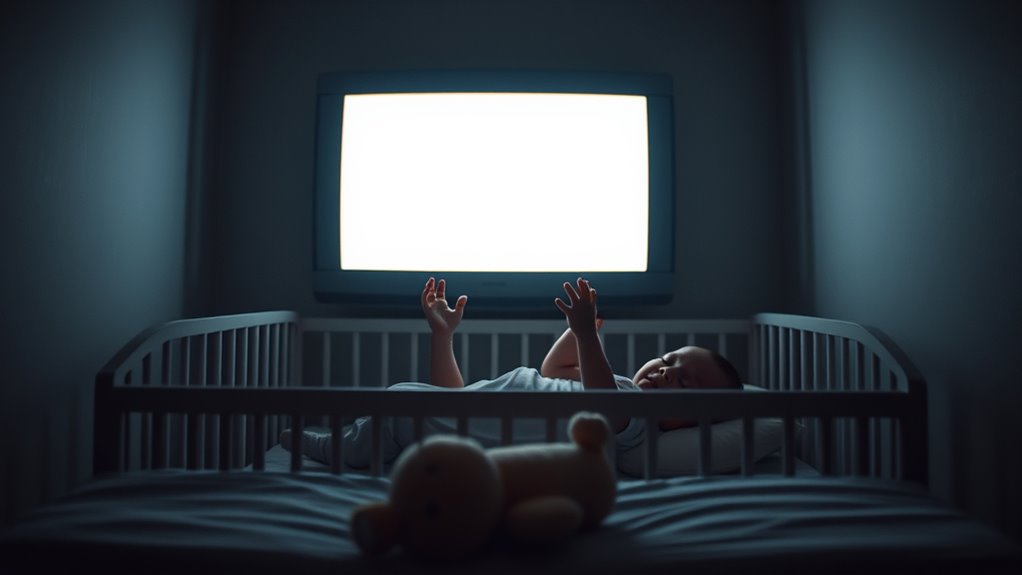
While many parents may not realize it, increased screen exposure can greatly disrupt your baby's sleep patterns.
Research shows that excessive screen time, especially in the evening, can lead to significant sleep disruption in infants. This not only reduces sleep duration but also affects sleep quality, making it harder for your little one to rest well.
Screens interfere with melatonin production, a hormone essential for regulating sleep cycles. As a result, your baby might develop irregular sleep schedules, potentially leading to developmental issues down the line.
To promote better sleep hygiene and overall health, it's important to limit screen exposure, particularly within 1-2 hours of bedtime. Prioritizing sleep can help guarantee your infant thrives during these critical early years.
Strategies for Managing Screen Time With Your Child
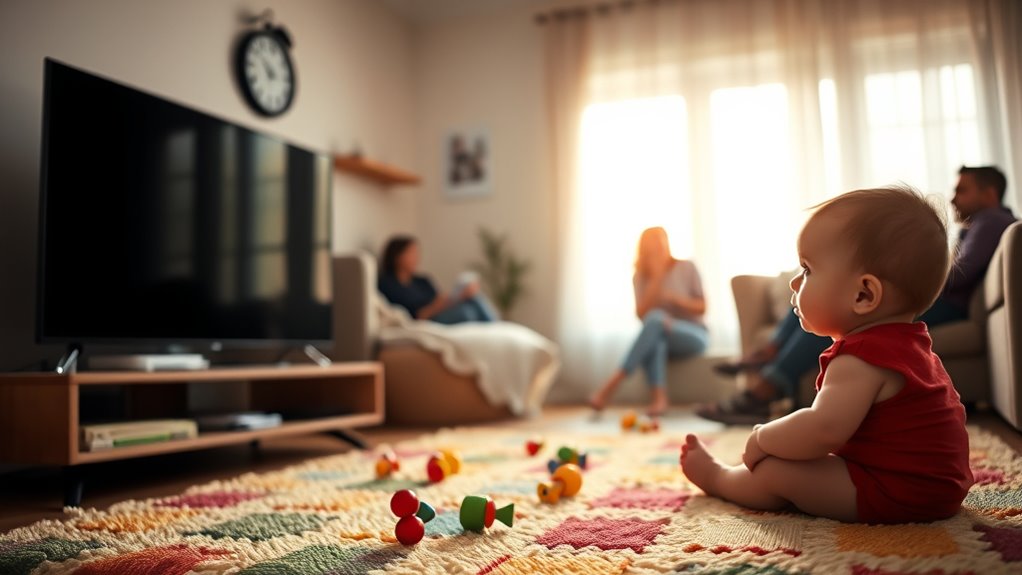
Managing your child's screen time is key to promoting healthy habits and ensuring they're not negatively impacted by excessive exposure.
The American Academy of Pediatrics recommends avoiding screens for children under 18 months and limiting screen time to one hour per day for kids aged 18 months to 5 years.
As parents, you should prioritize educational content that fosters language development and encourages interaction. Co-viewing with your child enhances their learning experience, allowing for discussions about what they watch.
Establishing a family media use plan helps set clear guidelines around screen time, ensuring a balanced approach.
Finally, eliminate screens from bedrooms and encourage screen-free activities like outdoor play to improve your child's overall well-being and sleep quality.
Engaging Activities to Replace Television
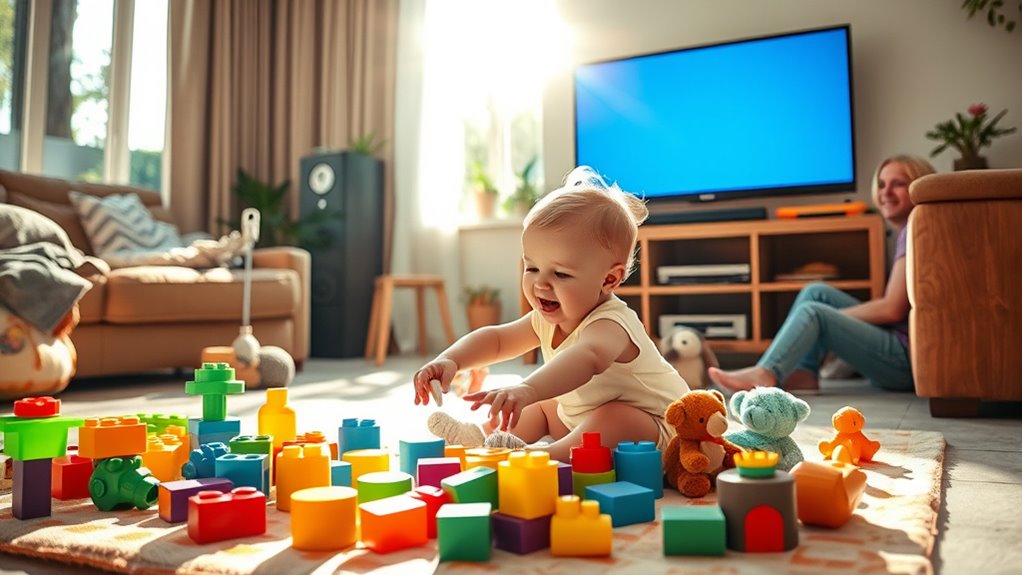
Finding engaging activities to replace television not only keeps your little one entertained but also supports their development in meaningful ways.
Instead of screen time, read aloud to your baby; this interaction greatly boosts their language development. Creative play with building blocks or art supplies enhances cognitive skills and imagination. Singing nursery rhymes and songs encourages verbal skills and auditory recognition, making learning fun.
Don't forget outdoor exploration! Physical activities promote motor skills and allow your baby to experience the world actively. Even simple household tasks, like cooking or gardening, can become learning opportunities.
Narrate your actions to enhance vocabulary and comprehension, creating a rich environment for your child's growth without the need for TV.
The Long-term Effects of Early Screen Exposure
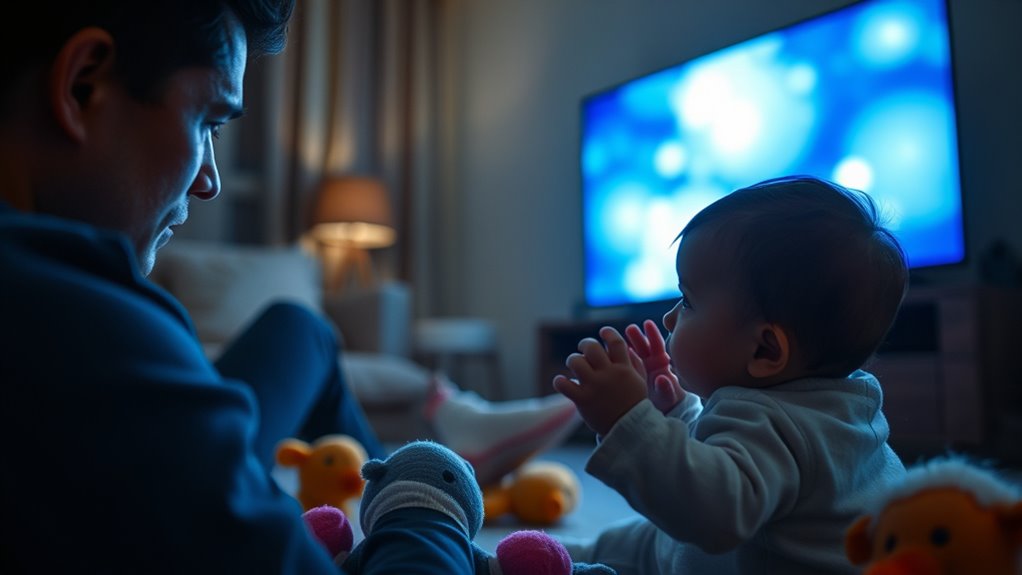
Engaging activities can provide a rich foundation for your baby's development, but it's important to contemplate the long-term effects that early screen exposure can have. Excessive screen time before 18 months can lead to delayed language development and lower cognitive functioning.
Research shows that preschoolers with high screen exposure often exhibit reduced brain white matter integrity, essential for language and literacy skills. Children heavily exposed to screens before age 2 may struggle with attention control and impulsive behavior later in life.
These long-term effects can include difficulties with memory and literacy, as well as impaired executive functioning, persisting into elementary school. Significant changes in brain activity linked to high screen time in infancy raise serious concerns about overall cognitive development.
Frequently Asked Questions
Is It Damaging for Babies to Watch TV?
Is it damaging for babies to watch TV? Yes, it can be.
Research shows that screen time before 18 months can delay language development and reduce opportunities for active learning. The American Academy of Pediatrics advises against screen exposure for young children, as it can hinder cognitive and social skills.
When babies watch more TV, they interact less with caregivers, which is essential for language acquisition and overall development.
Limit screen time for better growth.
Is There Any Harm in Screen Time for Babies?
Imagine a garden where little seedlings grow. If you water them with care and attention, they flourish. But if you drown them with too much water, they struggle to thrive.
Similarly, screen time for babies can hinder their growth. It can limit language development and reduce interaction with caregivers. You might think a little exposure is harmless, but it's essential to nurture their development through active engagement instead of passive viewing.
Is It Bad for Babies to Be in a Room With TV On?
Having the TV on in the background isn't great for your baby. It can distract both of you and reduce the quality of your interactions, which are essential for their language development.
When you engage directly, your baby learns more effectively. Plus, background TV can disrupt their sleep patterns, leading to irregular schedules.
It's best to create a focused, interactive environment for your little one to thrive and grow.
How Can Screen Time Affect a Baby's Developing Brain?
Think of your baby's brain as a sponge, soaking up everything around them.
When you let screens take center stage, that sponge gets filled with static instead of rich language and interaction. Excessive screen time can stifle their language skills and memory development.
It reduces precious moments of connection with you, which are essential for learning. By limiting screen exposure, you help nurture their growing mind and foster meaningful communication.
Conclusion
In the end, the question lingers: is that screen really worth it? As you weigh the risks of early exposure to television against the precious moments of genuine interaction, remember that your baby's brain is still developing. Those early years are vital, and the choices you make now could shape their future. So, before you turn on that TV, think about what you might be sacrificing—because once those screens light up, there's no going back.









